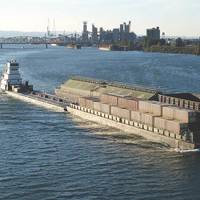Thome Group Shifts to Remote Audits Due to COVID-19 Restrictions

Singapore-based ship management company Thome Group said it has undergone a series of remote audits with DNV GL in various locations due to the widespread lockdown restrictions across the globe.Thome Mumbai office’s annual ISO 9001:2015 audit was performed online using video conferencing software which enabled document sharing and discussions to take place to verify that all requirements had been met. This was the first remote inspection that Thome had carried out and, because of its successful conclusion…
DAPI 101: Outreach and Enforcement
Even as the minimum Random Drug Testing Rate is raised to 50 PCT, the Coast Guard wants its mission to consist of 90% outreach and just 10% enforcement. Really.The domestic waterfront got some less-than-happy news when the U.S. Coast Guard announced that the calendar year 2019 minimum random drug testing rate had been set at 50 percent of covered crewmembers. It’s safe to say that nobody is happy about it, much less the Coast Guard itself.In truth, the Coast Guard had little to say about the matter. 46 CFR part 16.230(f)(2) requires the Commandant to set the minimum random drug testing rate at 50 percent when the positivity rate for drug use is greater than one percent.
Subchapter M: Post Publication Highlights

An extra T in TSMS, nowhere left to hide from systems documentation, and an emphasis on continuous improvement. Back in January of this year, the United States Coast Guard (USCG) predicted Subchapter M would be released in spring 2016. I put my money on June 20, that being the very last day of spring, and on June 20 the long-awaited regulation was finally published. Subchapter M doesn’t come with much we weren’t expecting, which is a good thing. Surprises in this industry are not met with enthusiasm. The USCG should be complimented in that regard.
MN100: Safety Management Systems, LLC

A leading US maritime consultancy established in 1996, SMSLLC provides practical risk mitigation solutions for vessel operators and stakeholders. Clients include a broad range of operators including Genesis Marine, American River Transportation Company, Seabulk Towing, Military Sealift Command and others. Primary services include, Regulatory Advisement, Internal Auditing, Risk Management, and the creation of Management Systems. SMS LLC has been in the business of bringing practical safety management solutions to the marine industry for 20 years.
The Master’s Authority: a Vital SMS Caveat

As safety management systems (SMS) on board vessels evolve, the vessel’s master still holds ultimate authority. Subchapter M is finally underway. A starring role in this new CFR is a safety management system onboard all vessels. While this system dictates how the vessel is to be operated and under what parameters, a key principle of any SMS is that the Master has the authority and the responsibility to override the SMS when safety of the crew, the vessel, or the environment is at stake.
The (Updated) Responsible Carrier Program

Last summer, the United States Coast Guard (USCG) announced its intent to accept the American Waterway Operators (AWO) Responsible Carrier Program (RCP) as an acceptable Towing Safety Management System (TSMS) under pending Subchapter M regulations. The acceptance did not come without some major changes to the RCP, changes that were needed to ensure the RCP would meet USCG requirements and become a viable option for operators once new Subchapter M regulations take effect. When that happens is anyone’s guess.
Subchapter M: The Designated Person Ashore and You

As the workboat industry marches toward Subchapter M, and ever closer to the International Safety Management (ISM) Code, the appointment of a Designated Person Ashore (DPA) becomes more important, the position’s job functions become more defined, and the selection of the right individual becomes more critical. The DPA can be a very important “pressure relief valve” that keeps emerging ethical and safety related concerns from exploding into litigation. The DPA allows anyone working on board a vessel to report perceived unethical behavior or unsafe conditions (including the safety of the crew…
New Year, New Vessel

Start the year off right with the newest addition to your fleet. Vessels come with lots of manuals and instructions as well as increasing amount of high-tech equipment. That said and even if it just involves a new digital camera or Blu-Ray Player, reading manuals is never exciting. Similarly, reviewing equipment documentation on a vessel is downright daunting, especially when you consider all of the other work it takes to get a vessel into service. That said; it is critical that the crew understand new equipment and are able to operate it.
An ISO Standards New Year’s Resolution:

As a maritime compliance auditor in the field, I’m often called upon to explain the ISO’s (International Standards Organization) approach to continual improvement which says a company shall establish, implement and maintain documented objectives and targets at each relevant function and level within the organization. This is only a requirement of the ISO’s “E” or environmental standard. To get to the “E” or ISO 14001 certification you must first list all the aspects of your business and how each impacts the environment.
NASSCO Receives ISO Certification
NASSCO has earned the designation as the first private shipyard in the U.S. to receive ISO 14001 certification for its comprehensive Environmental Management System and environmental protection policies. The certification process was conducted by ABS. ISO 14001 is a voluntary international standard that establishes the requirements for a company's Environmental Management System (EMS). Elements include environmental policy, planning, operational controls and internal auditing. The certification is also comprised of continual improvement in environmental performance and employee environmental awareness.






